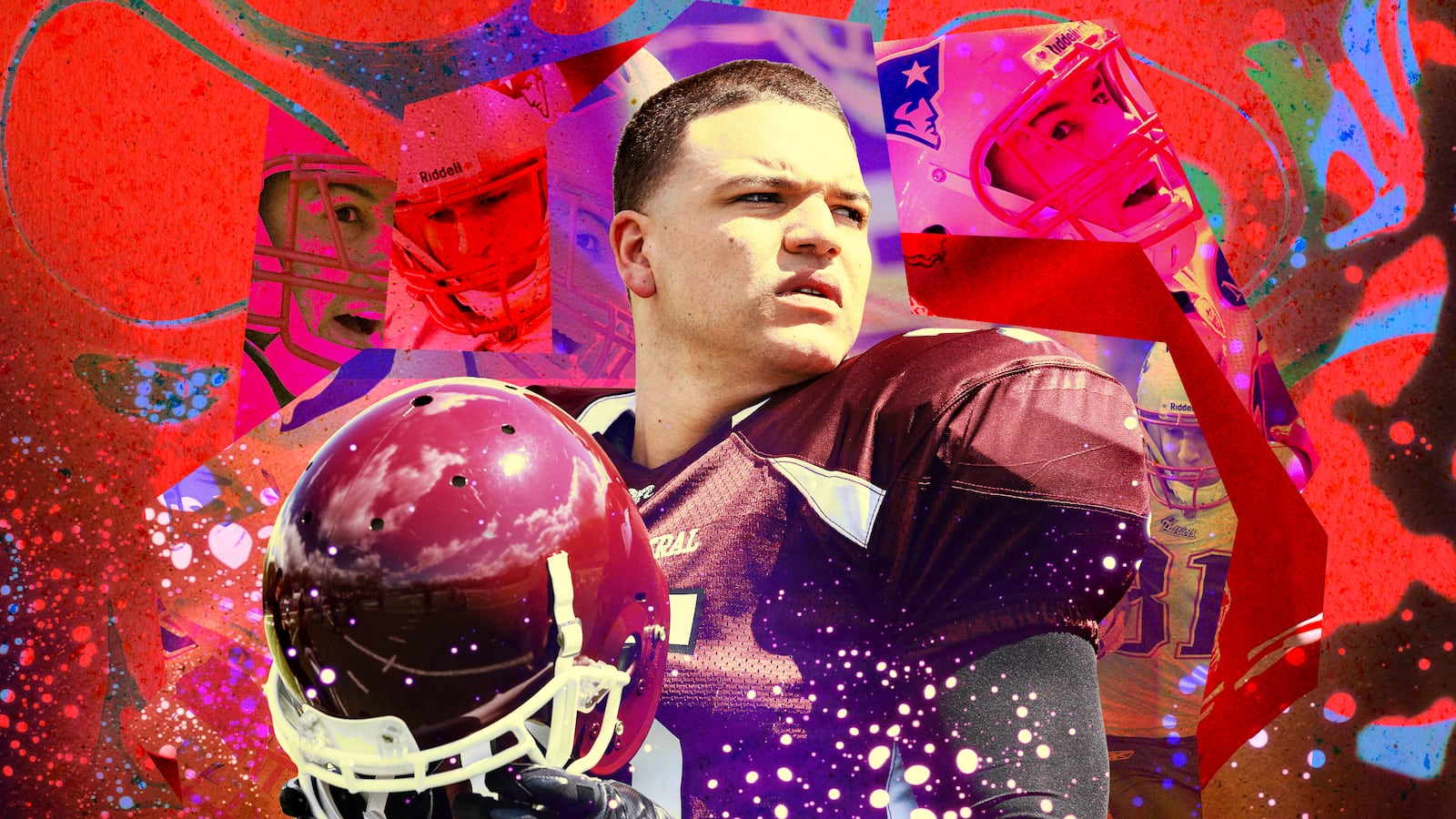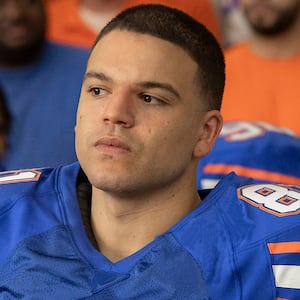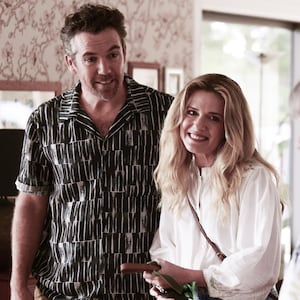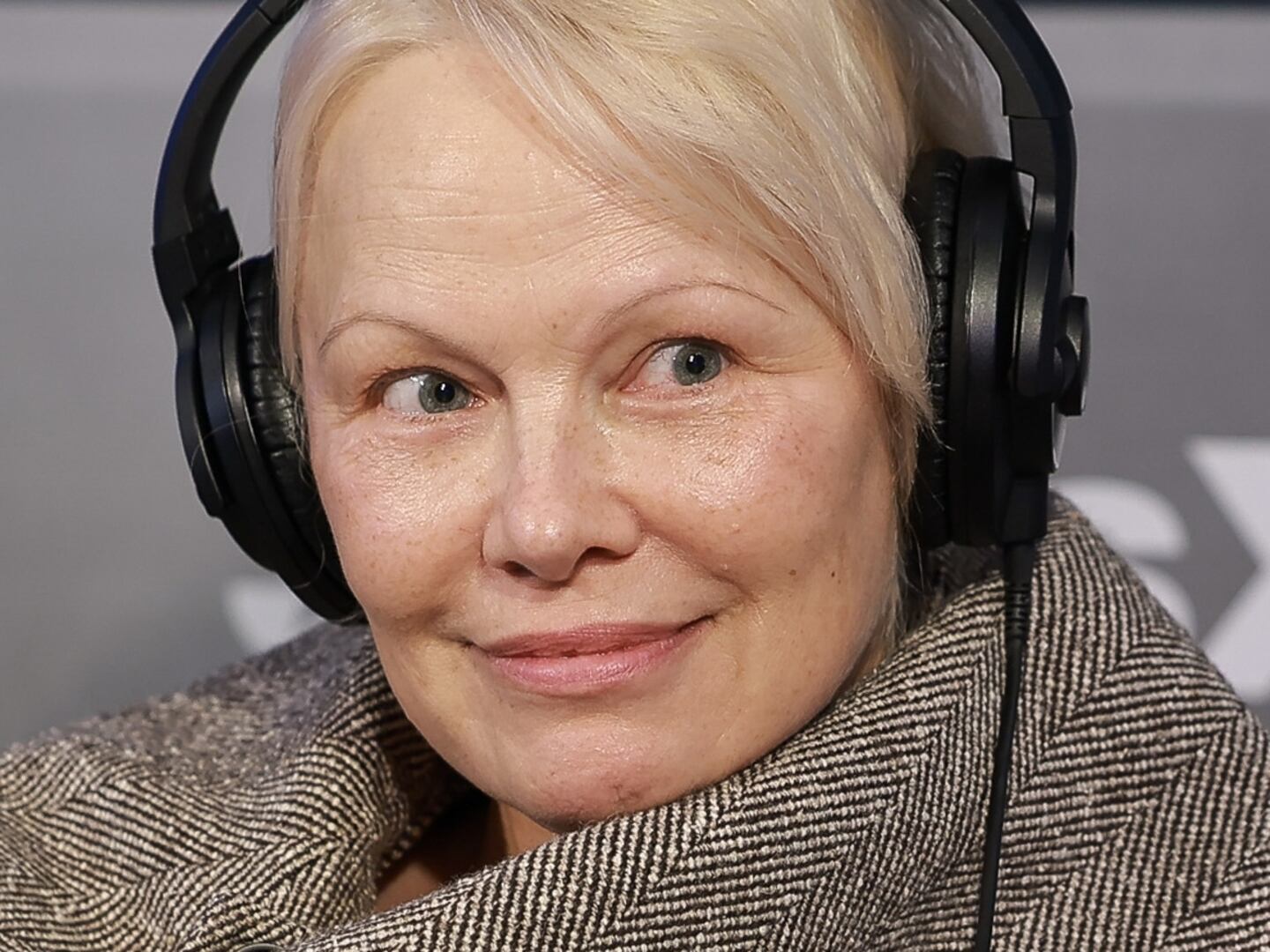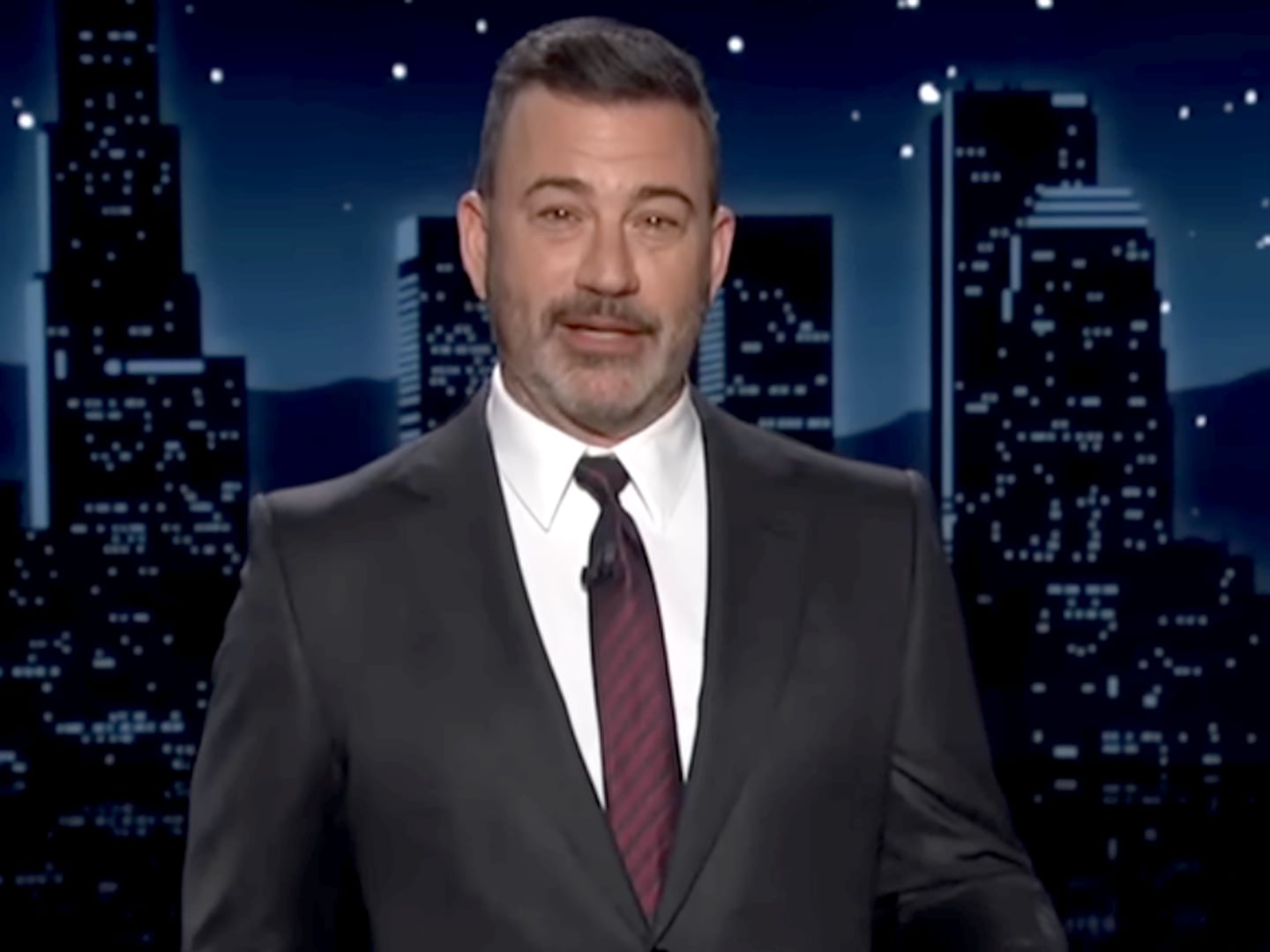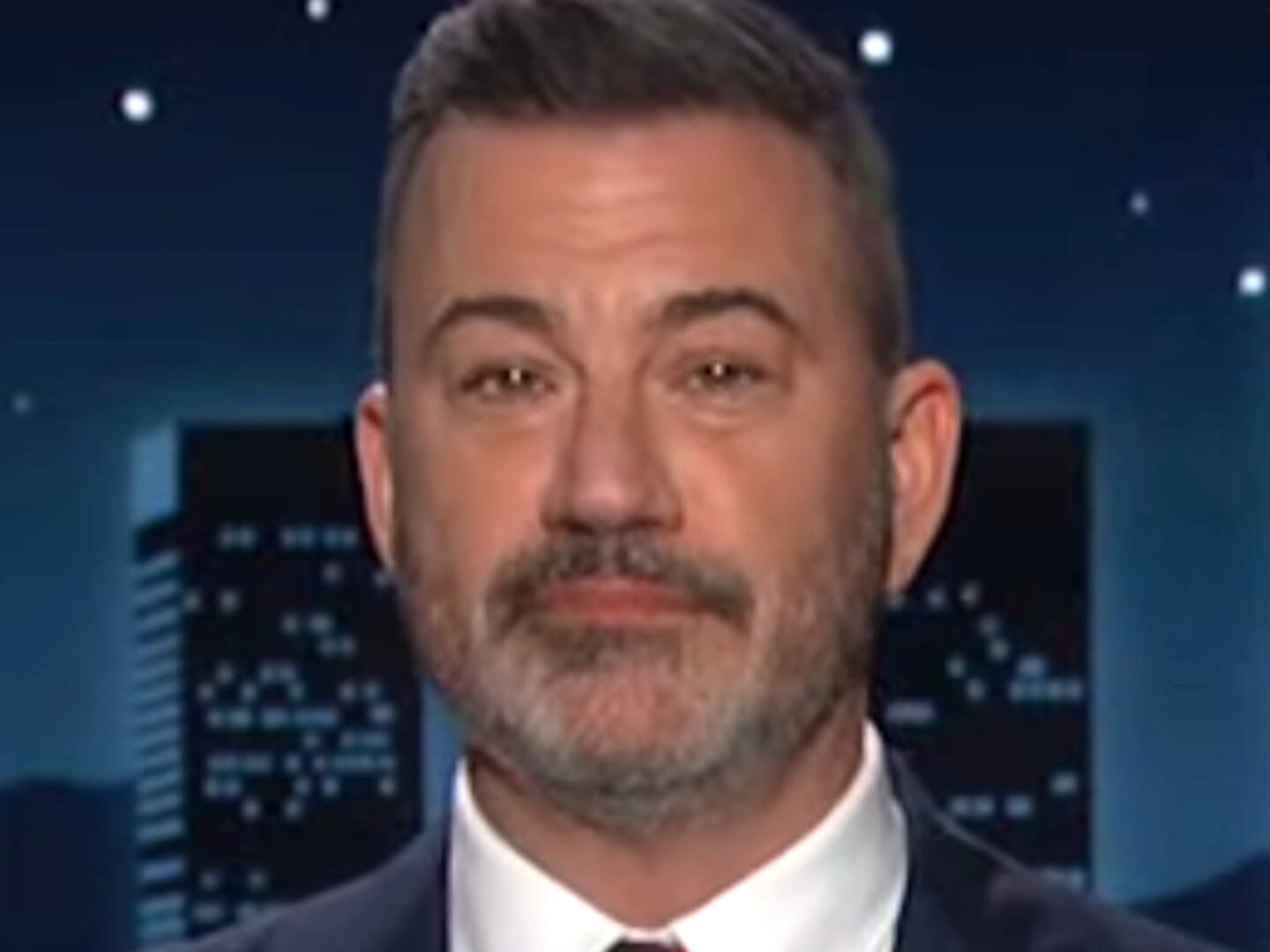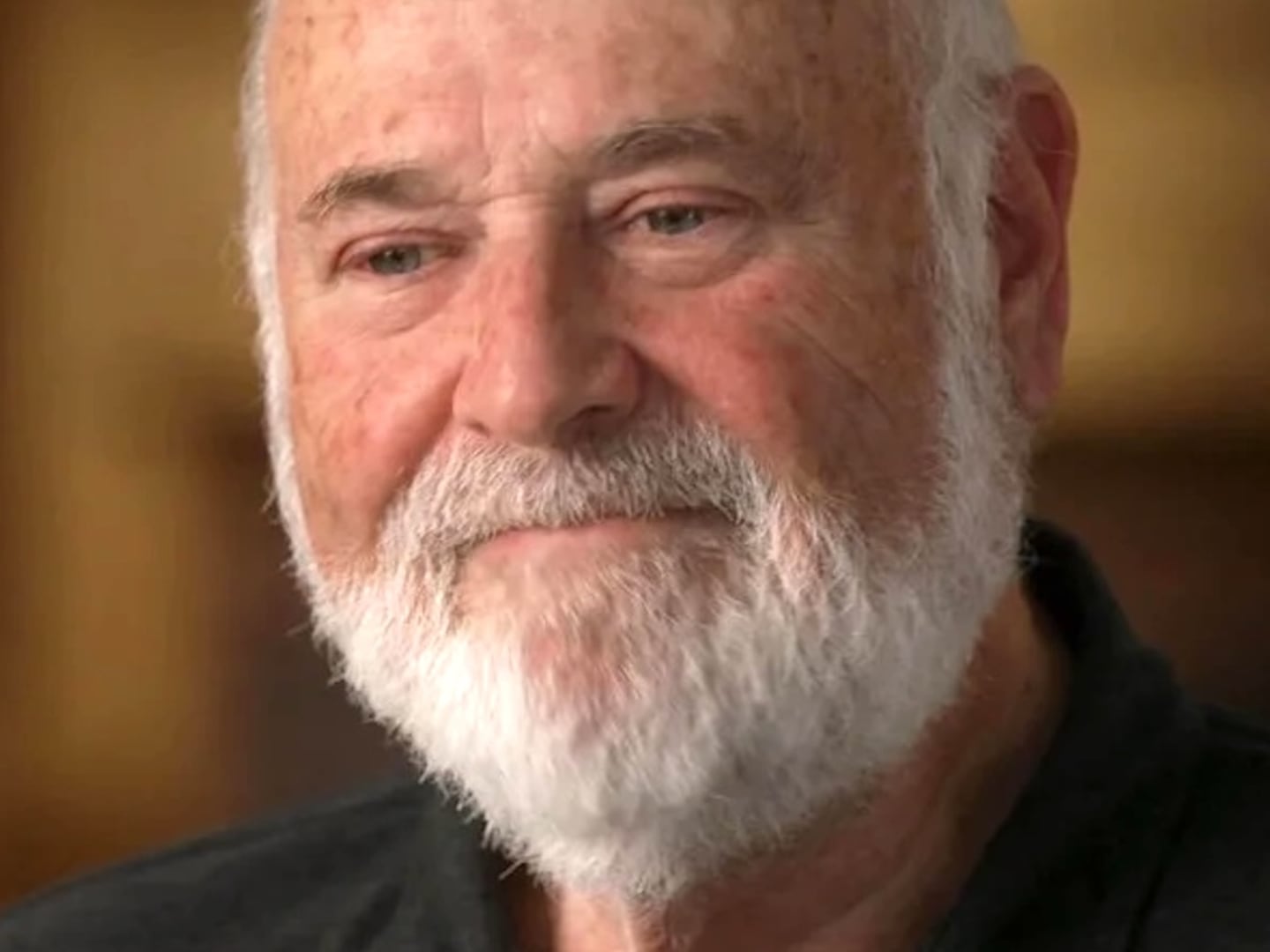Few stories lend themselves to sensationalism like that of Aaron Hernandez.
He was a rising star, a football hero, and an all-time great. And he was a criminal, a murderer, and a cautionary tale.
How do you square away those extremes? How do you find, beneath all of those titles and designations, a human? That was the challenge facing Josh Rivera, the actor playing Hernandez in American Sports Story: Aaron Hernandez, the new installment of Ryan Murphy’s American Story series chronicling the jaw-dropping rise and fall of a young athlete.
Hernandez’s story is a wild one. Even though we all lived through the headlines, reading the updates in disbelief, being reminded of the details in one single TV narrative is a destabilizing experience; you think, how did this happen?
He was a teenage phenom, one of the most promising high school football players in modern history, to the extent that the University of Florida recruited in the northeast for the first time just to snag him—convincing his family and school to let him graduate a year later to jumpstart his college career.
His on-the-field triumphs had him hailed as one of college football’s greatest tight ends. His off-the-field drug use and run-ins with the law caused skepticism about his future, to the extent that, despite his talent, he was merely a fourth round draft pick by the New England Patriots. While most players selected that late struggle to make a mark, he, alongside fellow tight end Rob Gronkowski, became a powerhouse player.
In 2013, he was arrested, charged, and later convicted of murder. While awaiting trial, he was indicted for another double homicide. In 2017, just after he was acquitted for those two killings, he was found dead by suicide in his jail cell.
Throughout his life, Hernandez struggled with his sexuality. As American Sports Story reveals, he had several sexual relationships with men that he felt ashamed about throughout his adult life, especially in a sports world that prizes machismo. In what ways did an upbringing relentlessly centered around training, immense pressure, being forced to become an adult too soon with no resources, and, perhaps even, CTE-related trauma from gameplay contribute to the darker aspects of his life?
“Some of the magnetism that comes with true crime is we think to ourselves, ‘I don’t feel like I’m capable of that. How is somebody capable of that?,” Rivera tells The Daily Beast’s Obsessed. “So you explore their background and their story, and it doesn’t necessarily make more sense how somebody could commit these acts, but it does give background and food for thought.”
Rivera, 29, is familiar with both the footlights of show business and the floodlights of the field.
He was a linebacker when he played football for his high school in Colorado. He was also heavily involved in the theater program, and eventually ditched his cleats for dancing shoes. When he was 24, when he was starring in the first national tour of Hamilton, he sent an audition tape to Steven Spielberg for his movie-musical remake of West Side Story. He was cast as Chino, the boy Maria’s (Rachel Zegler) family wants him to date.
In recent years, he’s appeared in the films Cat Person and The Hunger Games: The Ballad of Songbirds & Snakes. American Sports Story marks his first leading role.
With the show now streaming on Hulu—new episodes air on FX on Tuesdays—we spoke with Rivera about reconciling the Aaron Hernandez deemed a monster with the human he was portraying, the systems that may have failed the NFL star, and the prison tapes that gave him haunting insight into who Hernandez was beyond the headlines.

Josh Rivera
Eric Liebowitz/FXWhen you found out you were playing Hernandez, what resources did you go to first to learn more about him?
We had a lot of research at our disposal, which is very nice. There were some things that are public record, like some of the prison calls, which were really useful. Something that I found out was great for characterization was how he changed his voice depending on who he was talking to. It’s one of those things that actually is not uncommon to do for anybody. I think it’s earned a little bit more mystique because of who he was. But it was interesting to consider that, man, this guy might be kind of a chameleon. He’s very tender with some people. He’s got this kind of hood persona with certain people. There’s a lot of differences in how he carries himself depending on who he’s around.
It must be such an eerie experience to listen to the prison tapes of someone like Hernandez, who you know you’re then going to be channeling on set.
It was. I won’t lie to you, it was. It was a really interesting process preparing for it because the more that I learned, the more that I felt like it was a hefty responsibility to be sensitive with the information that I was getting. I mean, what an intimate thing to be privy to, this person’s calls with their family. I feel like I had a responsibility to treat that with a lot of respect and create that characterization coming from an understanding place.

Josh Rivera
Dia Dipasupil/Getty ImagesWhat was your experience playing football when you were younger?
I was a guard and a linebacker, so I was a lineman on offense and I was a linebacker on defense. I had a lot of fun. I’m not gonna lie, it was a blast. It was a really cool sense memory recall to come back to it. I know it’s hard to talk about football without having some criticism about certain factors of contact sports and CTE, but when I was playing there was a real charm to it.
That’s totally understandable.
I won't lie, there was something about being under the lights, and the magic of just being part of a team and having a common goal—helping each other physically to push towards the goal, literally. It was a funny full circle. I quit football to sing and dance. It’s funny coming back to it and being like, “Oh, wow. I’m so glad that this is part of my life.” Because. I get it. I get why there’s such a magnetism to the sport. It’s not without its flaws, but I do understand it.
Did you have to retrain your football skills for the show?
Oh, definitely, I had to retrain. It was like 12 years ago. I didn’t ever have to catch anything, and Aaron was like an amazing receiver. I had to do so many drills trying to learn how to, like, catch a ball. I have what they call lineman hands because they’re just made of stone. We had an amazing team that came and helped me train and prepare for that physically, which was a lot of fun. I haven’t played football in a long time. For a little while, my bones hurt, but that went away after a little bit of practice.
Watching the show and reading about Aaron, it seems that he struggled a lot with his masculinity and his sexuality, and how people would perceive him as a football player because of expectations about an athlete’s masculinity. I think you might have an interesting perspective on that, because you played football and you did theater. What is your take on the pressure of an athlete to maintain this archetype of masculinity?
I do have a lot of empathy towards that, considering that I went into theater and I think there are associations that certain people have with the theater community. It’s unfortunate that people feel pressured to hide bits of themselves, to protect themselves. Obviously, Aaron identified publicly as straight for his entire life, and once the layers get peeled back, it might have been a little bit more complicated than that.
Of course.
It is real food for thought, just how hard that must be. And there are people who have since, in professional sports, come out. I imagine that it’s really not easy, because then you wear this thing that doesn’t encompass all of who you are. It’s a part of you, but it’s not you, you know? But then it’s all that some other people see, which is too bad. I feel lucky that I had a lot of exposure to different kinds of people in my life, but not everybody’s had that kind of exposure.
I love the fact that someone who starred in West Side Story is also now playing one of the greatest tight ends from the New England Patriots.
It’s pretty neat. It’s definitely a transition, because we’re so used to boxing in people to one skill set, or one version of what they present to the world. So that’s what I really like about this story: genuinely, how it challenges the idea that a person is only one thing.

Josh Rivera in West Side Story
20th Century StudiosWhat do you think it is about Aaron’s life and what he did that makes this an “American” sports story, as the title suggests.
I’m glad you asked that. What cannot be ignored when talking about this series or anything that touches on this story is the cultural relationship to professional sports, and how that affects the individuals who pursue professional sports. It’s entertainment. There are trivial allegiances that people really ride for. There’s a really powerful fandom behind it. But then the individuals who pursue these sports are really young. They are young men who have very amazing and admirable physical talent, but they are young men.
People tend to forget or ignore that.
These are 18, 20, and 22 year olds. This is getting into my personal opinion, obviously, but there’s a cultural enabling of certain behaviors because of somebody’s athletic ability. And I think that if that weren’t present, maybe the outcome would be different. Maybe not. But I do think that there were a lot of factors that enabled this outcome, because of our cultural relationship to professional sports and how we deify and endow people with celebrity because of their physical abilities.
Was there something that seemed most daunting to you about playing in the show, knowing all the different parts of Aaron’s life that you’d be portraying?
I just think the fact that it was a real person was the biggest thing. For me, it was the sensitivity that we have to have with it, and the responsibility to make something that honors the people who were victimized by him. And then to also explain the circumstances while simultaneously not letting anybody off the hook who is at fault. It’s so many different factors. I want to do a good job. I want people to walk away thinking different things than they thought before.
Aaron was convicted of murder, so the court of public opinion is inclined to villainize him. But is there something that you hope people might take away from the series that might change how they think about him?
Because this is not a documentary, we have the luxury of making an adaptation that’s inspired by these events. There are some things that we can add, like behind closed doors conversations that nobody was privy to, conversations that were not public. We can explain what some of this substance is that amalgamated into this very complicated personality. And yeah, the court of public opinion when somebody murders somebody is very extreme. And I don’t think that that's like bad

Lindsay Mendez and Josh Rivera
Michael Parmelee/FXOh I worded that weirdly. I was not insinuating that it’s wrong to think that a murder is bad.
Yeah, it’s quite a natural, human phenomenon. That being said, with the dust settled several years later, there is room to explore how something like that could happen. I think with a lot of stories like his, some of the magnetism that comes with true crime is we think to ourselves, “Well, I don’t feel like I’m capable of that. How is somebody else capable of that?” You explore their background and their story, and it doesn’t necessarily make more sense how somebody could commit these acts. But it does give background and food for thought in terms of nature and nurture, human psychology, and biological wiring, versus what you were taught. I just hope the show makes people ask questions about themselves and about our culture’s relationship with celebrity and professional sports.
If you sit down on a Sunday to watch a football game now, does it feel different?
It does.There was a sequence that we did in the Scouting Combine where all of the players line up and they all have to strip naked, to their underwear. They’re all getting weighed and they’re taking stress tests, but they all just have numbers on them. It’s a total meat market of athletes. It exposed the industry aspect of the sport, where this is your product. You put them out and if they perform, that’s good for the brand. And it’s not specific to sports. Several industries that do exactly this. I am an actor. I am a product, in some regard. It’s food for thought when it comes to that aspect of all of this, for sure.

